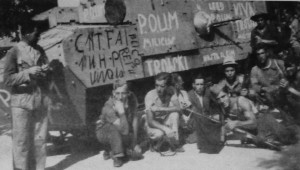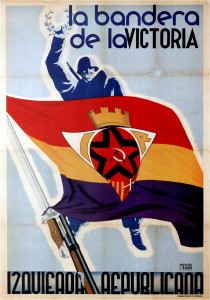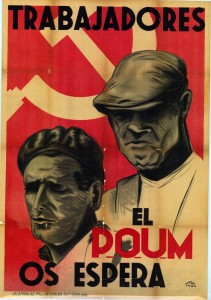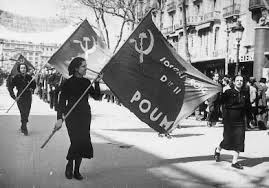 There is perhaps no subject among historians writing on the Spanish Civil War today that divides them more than do the May Events of 1937. Did these mark the end of anarchy and chaos on the Republican side or the beginning of a Stalinist-inspired counterrevolution? To be fair, some point can be made for both of the opposing views.
There is perhaps no subject among historians writing on the Spanish Civil War today that divides them more than do the May Events of 1937. Did these mark the end of anarchy and chaos on the Republican side or the beginning of a Stalinist-inspired counterrevolution? To be fair, some point can be made for both of the opposing views.
So what was actually happening in Barcelona in May 1937 in that week of ch aotic street fighting? The eventual outbreak of hostilities between CNT-FAI anarchists and POUM Marxists on one side and the communists of the Catalan communist party PSUC, backed by the Generalidad government on the other, could have been seen coming for some time. Tension in the anarchist stronghold of Barcelona had been increasing for some time, with the moderate leftwing Catalonian government trying to assert control over the province’s industries in order to create a more efficient war effort. The anarchists, who in the aftermath of the defeated Nationalist coup in the area had taken over control of factories and industry in general, were anxious to lose their revolutionary gains to what they saw as a counterrevolutionary government move in order to impose its will on the working classes.
aotic street fighting? The eventual outbreak of hostilities between CNT-FAI anarchists and POUM Marxists on one side and the communists of the Catalan communist party PSUC, backed by the Generalidad government on the other, could have been seen coming for some time. Tension in the anarchist stronghold of Barcelona had been increasing for some time, with the moderate leftwing Catalonian government trying to assert control over the province’s industries in order to create a more efficient war effort. The anarchists, who in the aftermath of the defeated Nationalist coup in the area had taken over control of factories and industry in general, were anxious to lose their revolutionary gains to what they saw as a counterrevolutionary government move in order to impose its will on the working classes.
Underlying the conflict lay a difference of opinion between the two groups concerning the way the war against Franco had to be waged. While almost all parties in the Republican Popular Front were convinced that a joint effort was needed by all the Republican parties in order to bring home victory, the anarchists and Marxists were convinced the war could never be successful if it was to be fought in a regular style and with regular armed forces instead of volunteer militia units. On top of that, what was the point if the war against Franco was won but in the meantime the revolution they all in the end strove to achieve would fail because of their incorporation in the hated machinery of the State?
 The fighting eventually was sparked off by the PSUC’s politician Joan Comorera who decided to bring vital strategic places in the city under centralized Generalidad command. When trying to take the Telephone Exchange building on May 3 the anarchists who from the start of the war had garrisoned it, refused to leave and a firefight ensued. In the meantime all over town revolutionary militias clashed with government forces trying to take control over the buildings they held. Barricades sprung up everywhere and the next few days Barcelona was the stage for a true civil war within the civil war. Eventually the CNT leadership managed to convince their supporters to cease fire and so after a week of shooting the peace returned. The PSUC took advantage of the situation to get rid of the Marxist POUM, which they blamed for every setback the Republic to that point had faced and managed to get the party suppressed. The CNT was still too powerful to get a similar treatment, but the PSUC was in no hurry and bided its time. As regards the joint anti-fascist unity, with the elimination of the POUM the communist party showed a nice piece of Newspeak, to speak with Orwell; propagating the fight for democracy and anti-fascist unity, but at the same time applying totalitarian measures to quell anyone or anything in its way. The POUM’s leader Andrés Nin was never seen or heard of again, most likely he was killed by communist agents.
The fighting eventually was sparked off by the PSUC’s politician Joan Comorera who decided to bring vital strategic places in the city under centralized Generalidad command. When trying to take the Telephone Exchange building on May 3 the anarchists who from the start of the war had garrisoned it, refused to leave and a firefight ensued. In the meantime all over town revolutionary militias clashed with government forces trying to take control over the buildings they held. Barricades sprung up everywhere and the next few days Barcelona was the stage for a true civil war within the civil war. Eventually the CNT leadership managed to convince their supporters to cease fire and so after a week of shooting the peace returned. The PSUC took advantage of the situation to get rid of the Marxist POUM, which they blamed for every setback the Republic to that point had faced and managed to get the party suppressed. The CNT was still too powerful to get a similar treatment, but the PSUC was in no hurry and bided its time. As regards the joint anti-fascist unity, with the elimination of the POUM the communist party showed a nice piece of Newspeak, to speak with Orwell; propagating the fight for democracy and anti-fascist unity, but at the same time applying totalitarian measures to quell anyone or anything in its way. The POUM’s leader Andrés Nin was never seen or heard of again, most likely he was killed by communist agents.
As regards the question who was to blame for the wasted efforts in Republican Barcelona, the answer will be twofold; most obvious ‘law and order’ prevailed and the anarchists yielded to the government’s wish to centralize units of production and power in the hinterland so in that respect it may be positive for the Republic’s leadership to have a direct command over its resources in order to direct the war effort most efficiently.  On the other side however, one of the main strengths of the Republican fighters was the high morale and the zeal with which they went into battle. Their goal was a positive one; to save democracy from its doom, or even to build a whole new society, as was the case with the more revolutionary Republicans. One effect of the May Events was that they put a halt to much of the revolutionary breeze that was blowing and that encouraged so many to risk everything in order to save the Republic. The disillusionment that was brought about by the outlawing and persecution of the POUM and its leaders drove a wedge in the Republican camp. Leftwing socialists and anarchists, who made up the bulk of the republic’s supporting groups, felt threatened by the slowly increasing hold of the communist parties on both the Republican and the Catalonian governments, feeling that the move towards ‘law and order’ would not stop with a halting of the revolution, but that democracy in Spain was also being threatened from inside by the Stalinists parties. As the Republic eventually lost the war in Spain, it remains unclear what would have been the role of the communist parties in a post-war Spain with fascism defeated, but their behaviour during the war among their supposed allies did not bode well.
On the other side however, one of the main strengths of the Republican fighters was the high morale and the zeal with which they went into battle. Their goal was a positive one; to save democracy from its doom, or even to build a whole new society, as was the case with the more revolutionary Republicans. One effect of the May Events was that they put a halt to much of the revolutionary breeze that was blowing and that encouraged so many to risk everything in order to save the Republic. The disillusionment that was brought about by the outlawing and persecution of the POUM and its leaders drove a wedge in the Republican camp. Leftwing socialists and anarchists, who made up the bulk of the republic’s supporting groups, felt threatened by the slowly increasing hold of the communist parties on both the Republican and the Catalonian governments, feeling that the move towards ‘law and order’ would not stop with a halting of the revolution, but that democracy in Spain was also being threatened from inside by the Stalinists parties. As the Republic eventually lost the war in Spain, it remains unclear what would have been the role of the communist parties in a post-war Spain with fascism defeated, but their behaviour during the war among their supposed allies did not bode well.
Wouter van Dijk
Want to know more about the 1937 May Events in Barcelona? Then a read of ‘Homage to Catalonia’ by eye-witness George Orwell, POUM-militia man at the time, is highly recommended

Pingback:
Ready for Revolution, Agustín Guillamón |